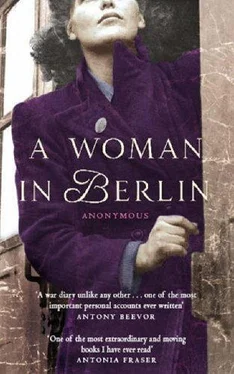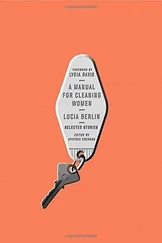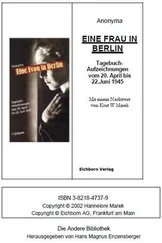Then the long march back home. A poster in German and Russian proclaims the imminent opening of a ‘free market’. By whom? For whom? A ‘wall paper’ – a news-sheet posted on a wall – announces the new heads of the city – all unknown dignitaries, presumably repatriated Germans from Moscow Colourful troops of Italians stepping my way, singing, loaded down with trunks and bundles, evidently for the journey home. More bicyclists rattled past on bare rims. Schoneberg was more forlorn, and the ghost tunnel by the S-Balm was black and deserted. I was glad when it was behind me, when I saw the buildings on our block. I returned home as if from a big trip, and divvied up my news.
Tired feet, humid day. Now the evening brings rest and rain.
By six in the morning the widow was already up and moving about the apartment. She’d received a note from the building chairman the previous evening. (Building chairman is another new invention. In our building the role is being played by the husband of the woman from Hamburg.) The note, which was on a mimeographed scrap of paper, instructed the widow to report at the town hall at 8 a.m. for work, nothing more. ‘It would be nice if it turned out to be cutting asparagus,’ she mused, making our mouths water at the prospect of a tasty dinner.
So today I played housewife and cooked some pea-flour soup for Herr Pauli and myself. At around 2 p.m. we heard loud shouting from down on the street outside our house – a kind of official town-crier, exactly like a thousand years ago. He’d planted himself under the maple tree and was rattling off information from a piece of paper: all men and women between fifteen and fifty-five years of age capable of work and currently unemployed should report to the Rathaus at once for labour duty.
That set off a great debate in the stairwell: to go or not to go? The bookselling wife cast her vote for; she was afraid that otherwise they’d come and take us by force. I joined her, and together we set off. I asked her if she knew what was going on with their bookshop. a burned down at the end of April,’ she answered tersely. Nevertheless she is pretty optimistic about the future, and told me about a huge crate of books in the basement that she managed to keep safe throughout the Third Reich – mostly ‘forbidden’ literature, that is, works that were banned in our country after 1933. At first this meant texts by Jews and emigrants, later by opponents of the war. ‘People have a craving for these things right now,’ she claims. ‘We’re going to wall off a corner of the shop and start a lending library – with a stiff deposit on the books, of course, or else they’ll be gone in no time.’ I told her I’d be the first to sign up; I have a lot of catching up to do.
The steps outside the Rathaus were filled with women pushing and shoving one another – the men were few and far between. With a great deal of shouting and gesticulating, a youth took down our names. The patch of street outside the town hall looked like an extremely busy construction site. The trench in the middle of the boulevard, which was carved out for mysterious military purposes by a handful of Germans and several Russian girls in quilted jackets – forced labour – is now being filled in again, this time solely by Germans. This has a certain logic for me. Women are pushing the carts loaded with sand, brick rubble and fire-blackened debris up to the edge and tipping the contents into the trench. Bucket brigades have been lined up on all the side streets, and bucket after bucket is being passed up to the carts. I’m supposed to join in tomorrow morning at 8 a.m. I have nothing against that.
I looked for the widow among the women working, but didn’t see her. At one point a car with a loudspeaker pulled up, blaring the latest news in Russian-accented German. Nothing I hadn’t heard before.
This evening we had bread with canned meat. The widow still hadn’t come back – it was 9 p.m. before we saw her red hat down on the street. She was absolutely exhausted, drained, done in. A few short, unintelligible angry sounds were all we got out of her – she refused to tell us what had happened. Finally, after an endless amount of time washing up, she managed to utter a few sentences, from which it was dear that there had been no asparagus. A Russian truck had transported the women to a machine works, where the widow and some two hundred others spent the whole day packing parts in crates, then unpacking them, repacking them and wrapping them up – all under the eyes of stern Russian overseers. The widow had been jostled and shoved constantly; all they’d given her to eat was a crust of dry bread for lunch.
‘And they call that organization!’ She was indignant. ‘What a muddle, what a mess!’
Then she told us some more: ‘We pointed out to them right away that the iron parts were too heavy and would break the bottoms of the crates. And they just yelled at us to shut up and, “ Rabota, rabota!” – Work, work! So when the first crate broke into pieces as soon as it was lifted, they really laid into us, and of course it was all our fault!’ Shaking her head, she added, ‘It’s a puzzle to me how these people managed to win the war. Any German schoolchild has more sense than they do.’ And the went on listing other examples of poor planning and stubborn insistence on the part of the Russians, to the point where she couldn’t calm down. She’d had to come home on foot – which took a whole hour and a half – since they hadn’t provided a truck to transport the women back after work. As a result she has a blister on her toe; she yammers on about that and about our fate and the German defeat. Nothing can console her, not even the hammer, the pliers, the dust rag or the tin cup she smuggled out of the factory under her dress.
Fitted out with bucket and dustpan, I marched off to the Rathaus in the grey morning rain. Before I got there it was coming down in sheets; I could feel my knit dress soaking up the water.
The rain kept coming – now a light drizzle, now a substantial downpour. Nonetheless we kept on scooping and shovelling, filling bucket after bucket with dirt so there wouldn’t be a break in the chain of hands. There were about a hundred women of all types. Some proved sluggish and lazy and didn’t move a muscle unless one of our two German overseers was looking. (It’s always the men who get to do the supervising.) Others went at it like avid housewives, with dogged determination. ‘Well, the work has to get done,’ said one woman with great conviction. Once a cart was loaded, four of us shoved it up to the trench. I learned how to operate a swivel plate. We worked until the heavy rain forced us to take a break.
We stood under a balcony, huddled close like animals, our wet clothes sticking to our bodies. The women shuddered and shivered. We took advantage of the opportunity to eat our wet bread as it was, with nothing on it. One woman muttered in a thick Berlin accent, ‘Never ate the likes of this under Adolf.’
She was challenged on all sides. ‘It’s thanks to your Adolf we’re eating this.’
Embarrassed, the woman said, ‘That’s not how I meant it.’
We stood like that for over an hour in the pelting rain. When it began to taper off, our supervisor – a man with a Czech-sounding name and a Viennese accent – sent us back to the carts. We called these carts ‘lorries’ – which sounded like a girl’s name, and christened one the ‘Laughing Laurie’ and the other the ‘Weeping Laurie’. But someone scratched out ‘Weeping’ and wrote ‘Smirking’ instead.
Around 3 p.m. our Viennese overseer finally checked our names off his list and let us go home. On the way back I was swinging my bucket gaily, in the spirit of ‘what doesn’t kill me makes me stronger’.
Читать дальше












